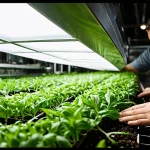The organic market is gaining momentum globally, driven largely by consumer demand for healthier, environmentally friendly food options. This shift presents both challenges and opportunities for agribusinesses in the United Kingdom. As we explore the various facets of organic farming, from production to market access, we’ll delve into the intricacies of this evolving landscape.
The Growing Demand for Organic Foods
Over the past few years, the demand for organic foods has surged, reflecting a broader trend toward sustainable and health-conscious living. Consumers are increasingly looking for food that is free from chemicals, pesticides, and genetically modified organisms (GMOs).
In parallel : Top tips for choosing the best strapping material for your needs
In the UK, this demand is reflected in the steady growth of the organic food market. According to the Soil Association’s Organic Market Report, sales of organic products in the UK have been rising consistently, with the market valued at over £2.79 billion in 2023. This growth can be attributed to several factors, including heightened awareness of food safety, environmental concerns, and the benefits of organic farming on soil health.
For UK agribusinesses, this trend presents a significant opportunity. By transitioning to organic farming practices, farmers can tap into a lucrative market that values quality and sustainability. The environmental benefits also align well with the UK’s climate goals, promoting a more sustainable food production system.
In parallel : Top transport and logistics services in calais for businesses
However, entering the organic market is not without its challenges. Organic certification requirements can be stringent, and the transition period from conventional to organic farming can be lengthy and costly. Additionally, organic farming often involves lower yields, which can impact profitability in the short term.
The Role of Sustainable Agriculture
Sustainable agriculture is a key component of the organic farming model. This approach emphasizes practices that are environmentally friendly, economically viable, and socially responsible. In the context of the organic market, sustainable agriculture involves methods such as crop rotation, composting, and biological pest control.
For UK agribusinesses, adopting sustainable agriculture practices can offer several benefits. Firstly, sustainable farming enhances soil health, leading to more resilient crops and better long-term yields. It also reduces reliance on chemical inputs, lowering production costs and minimizing environmental impact.
The European Union and the UK government have been supportive of sustainable agriculture through various policies and subsidies. These initiatives aim to encourage farmers to adopt practices that contribute to food security, reduce greenhouse gas emissions, and support biodiversity.
However, there are also challenges associated with sustainable agriculture. Implementing these practices often requires significant upfront investment in new technologies and infrastructure. Additionally, there is a learning curve involved, as farmers need to acquire new skills and knowledge to successfully transition to sustainable methods.
Despite these challenges, the shift towards sustainable agriculture represents a significant opportunity for UK agribusinesses. By embracing these practices, farmers can position themselves as leaders in the organic market, offering products that meet the growing demand for sustainability and health safety.
The Impact of Climate Change on Organic Farming
Climate change poses a significant threat to global agriculture, and organic farming is no exception. Rising temperatures, changing precipitation patterns, and more frequent extreme weather events can all impact crop yields and food production.
In the UK, the agricultural sector is already experiencing the effects of climate change. Farmers are facing challenges such as drought, flooding, and unpredictable weather patterns, which can disrupt planting and harvesting schedules. These challenges are compounded for organic farmers, who rely on natural methods of pest and disease control, making their crops more vulnerable to climatic fluctuations.
However, organic farming also has the potential to mitigate some of the impacts of climate change. Practices such as crop rotation, cover cropping, and reduced tillage can improve soil health and increase carbon sequestration, helping to reduce greenhouse gas emissions. Additionally, organic systems are often more resilient to extreme weather events due to their focus on soil health and biodiversity.
For UK agribusinesses, addressing the challenges posed by climate change will require a multifaceted approach. This includes investing in climate-smart agriculture practices, developing resilient crop varieties, and improving water management systems. By doing so, farmers can enhance their ability to adapt to changing climatic conditions and ensure the long-term sustainability of their operations.
Market Access and Supply Chain Challenges
Access to markets is a critical factor for the success of UK agribusinesses in the organic sector. While the demand for organic products is growing, farmers often face challenges in getting their products to market. This can be due to a variety of factors, including logistical barriers, supply chain inefficiencies, and competition from imported products.
One of the key challenges is the fragmented nature of the organic supply chain. Smallholder farmers, in particular, may struggle to access larger markets due to limited resources and infrastructure. Additionally, the organic certification process can be complex and costly, creating barriers for smaller producers.
To overcome these challenges, UK agribusinesses need to focus on building robust and efficient supply chains. This includes investing in logistics and distribution networks, as well as fostering partnerships with retailers and distributors. Technology can also play a crucial role in streamlining the supply chain, with tools such as blockchain providing greater transparency and traceability.
Government policies and support can also help to improve market access for organic farmers. This includes initiatives to promote local and regional food systems, as well as subsidies and grants for organic certification and infrastructure development. By creating a more supportive environment for organic farming, the UK can enhance the competitiveness of its organic sector on both a national and global scale.
Opportunities for Innovation and Growth
Despite the challenges, the organic market presents numerous opportunities for innovation and growth. Advances in technology, research, and market development are opening up new possibilities for UK agribusinesses.
One area of innovation is smart agriculture, which leverages technology to enhance farming efficiency and productivity. This includes precision farming techniques, such as the use of drones and sensors to monitor crop health and optimize resource use. By adopting smart agriculture practices, organic farmers can improve their yields and reduce environmental impact.
Research and development also play a crucial role in advancing the organic sector. Institutions and scholars are conducting studies to develop new organic farming practices, improve pest and disease management, and enhance crop varieties. Platforms like Google Scholar provide access to a wealth of academic research that can inform and support the growth of the organic market.
Market development is another key area of opportunity. As consumer awareness of organic products continues to grow, there is potential for expanding the range of organic offerings. This includes not only fresh produce but also processed and value-added organic products. By diversifying their product lines, UK agribusinesses can tap into new market segments and increase their revenue streams.
In conclusion, the challenges and opportunities for UK agribusinesses in the organic market are multifaceted. While there are significant hurdles to overcome, including climate change, supply chain inefficiencies, and certification barriers, there are also numerous opportunities for growth and innovation. By embracing sustainable agriculture practices, investing in technology and research, and building robust supply chains, UK agribusinesses can position themselves as leaders in the organic market and meet the growing demand for healthy, sustainable food.
The organic market presents a dynamic and evolving landscape for UK agribusinesses. By understanding and addressing the challenges, and capitalizing on the opportunities, farmers and producers can thrive in this sector. As consumer demand for organic foods continues to grow, the future of the UK organic market looks promising, offering a pathway to sustainable and profitable agriculture.











